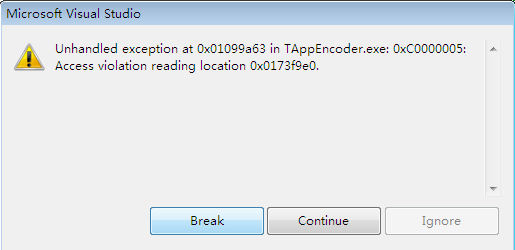Unhandled exception at 0x........ in XXXX.exe: 0xC0000005:Access violation reading location 0x......
对于C++初学者或粗心者,很容易犯如下图所示错误:

那么该错误是由什么造成的呢?
答案无疑只有一个,即:读取了本该没有的值或者地址。
那么如何解决呢?
 C++内存访问越界详解
C++内存访问越界详解

 1893
1893
 2668
2668
 1464
1464

 被折叠的 条评论
为什么被折叠?
被折叠的 条评论
为什么被折叠?


